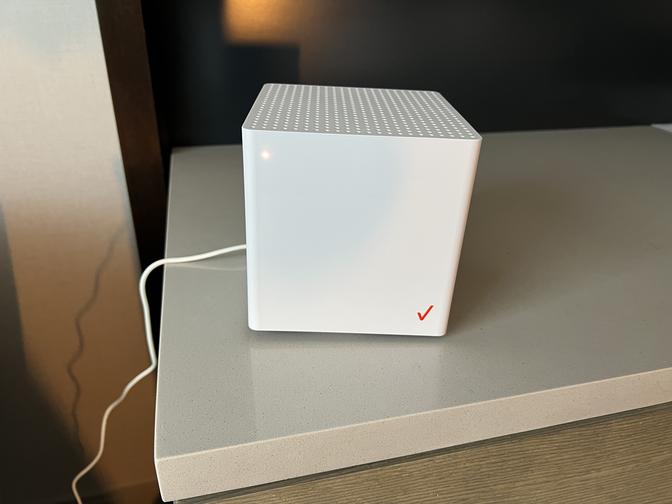
You’ve got 5G on your phone, but could you save money by switching to 5G internet for your whole house?
Home internet that’s as easy as plug and play.
That’s the promise of new 5G wireless home internet options from Verizon and T-Mobile.
It’s like the internet on your phone, but for your entire house.
Follow Rich DeMuro on Instagram for more tech news, reviews and cool stuff.
To test it out, I tried Verizon’s 5G Home Internet. Although my home doesn’t pull in the best signal for the service, which is 5G UW, I was able to test it in various locations that did, including a hotel room in San Francisco and my studio at KTLA.
The service couldn’t be easier to set up – you just plug in a cube, wait for it to connect to a cellular signal and then it spits out a WiFi signal you can connect your devices to.
This service can potentially replace the hardwired internet connection you’re used to getting from a cable provider or telephone company.
For some more thoughts on the services, I talked to Sascha Segan, a network testing guru at PCMag.com.

“So far it’s really good if you can get it,” explained Segan.
One of the issues with this home internet is that not every address is ready for it, and even if it is, a lot of the quality of service depends on the signal you can get at your home. It’s recommended that you place the receiver near a window to pull in the best signal.
“Changing conditions in the wireless networks around you tend to make speeds fluctuate a lot more than they do especially with fiber,” said Segan.
But if all you need is internet for basic, everyday tasks like watching Netflix, surfing the web and making Zoom calls, these services could save you big bucks.
Plans start at $25 for Verizon’s 5G Home Internet and have no data caps. You’ll need to be a Verizon Wireless customer to get the best prices, though.
T-Mobile’s service, which I didn’t test personally, is $50 a month.
It’s hard to believe that a cell phone signal can provide internet to your entire home, but 5G offers speeds and bandwidth that’s far ahead of what LTE could offer, which is why you’re seeing these services suddenly pop up.
The speed you’ll get is the biggest question mark. Personally, I would do a speed test with my phone inside my house to see what sort of speed I might get. Keep in mind, the phone you use needs to be on the network you’re considering for home internet (Verizon or T-Mobile) and your existing WiFi needs to be turned off so you can get a speed that measures the cellular signal and not your WiFi connection.
But bottom line – if you can get a good speed at your home and the price for 5G internet is cheaper than what you’re paying, it’s worth considering.
“If you have a really overpriced cable service that’s been really unreliable, this provides you with a terrific alternative,” concluded Segan.
( function () {const contact_forms = document.getElementsByClassName('contact-form');for ( const form of contact_forms ) {form.onsubmit = function() {const buttons = form.getElementsByTagName('button');for( const button of buttons ) {button.setAttribute('disabled', true);}}}} )();Your name(required)Your email(required)Report a typo or grammatical error(required)Δdocument.getElementById( "ak_js_1" ).setAttribute( "value", ( new Date() ).getTime() );
}})